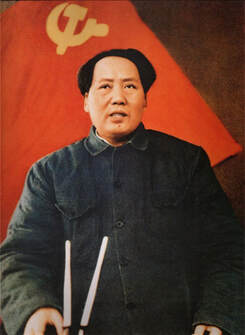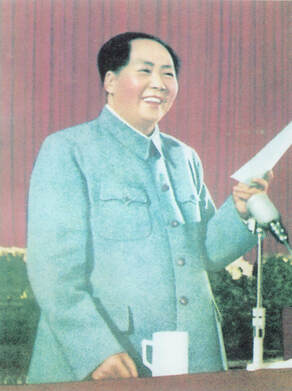CHAPTER 12 "Paper Tigers"For the first six months after the civil war resumed at the end of WW II the GMD made advances, but by 1949 the GMD had to abandon China proper and retreat to Taiwan. The beginning of this chapter describes the military and social factors that led to this massive GMD defeat. Basically the People's Liberation Army (PLA)-- the new name for the Red Army, won due to the incompetence of the GMD officers, including Chiang, the cruelty of their recruitment methods (forced impressment of soldiers) and the worthlessness of their cause (the maintenance of class oppression of the peasants who made up 90% of the population). Chiang had more troops and he was being supported with money and material by the US (ever the friend of fascist dictators and against the popular masses and yet pretends to be a democracy) and still he lost. Short says "Mao relied on the 'collective will of the masses', And that "was more than enough." At this time Mao made his "paper tigers" comment. "All reactionaries are paper tigers." This isn't the case that the tigers don't have claws. It is because the masses ultimately determine history. The desire for freedom and human emancipation are stronger than the weapons of the repressors. Hitler and Johnson were paper tigers in this respect— Bush, Obama, and Trump were as well, it comes with the job of president— as are all reactionaries. Mao underestimated the power of the A bomb-- he called it "a paper tiger" because people, not weapons, decide "the outcome of a war." But a weapon that can destroy humanity deserves a little more respect. No sensible tiger would attack an animal that it knows will also kill it. On October 1, 1949 the People's Republic of China was proclaimed. It was to be 'a people's democratic dictatorship.' How, you might ask, can there be such a thing as a "democratic dictatorship"? Is this not a contradiction? How can the same thing be a gas and a solid (water)? Without an understanding of dialectics, especially the unity of opposites, it is difficult to understand. Lenin's "dictatorship of the proletariat" as a democratic measure causes similar confusions, even in the top leadership of some CPs. Short quotes from Mao's 1949 "On the People's Democratic Dictatorship": "[The reactionaries say:] 'You are dictatorial.' Dear Sirs, you are right, that is exactly what we are ... Only the people are allowed the right to voice their opinions. Who are 'the people'? At the present stage in China, they are the working class, the peasant class, the petty bourgeoisie and the national bourgeoisie. Under the leadership of the ... Communist Party, these classes unite together to ... carry out a dictatorship over the lackeys of imperialism -- the landlord class, the bureaucratic capitalist class and the GMD reactionaries and their henchmen -- to suppress them and [ensure] they behave properly ... The democratic system is to be carried out within the ranks of the people ... The right to vote is given only to the people and not to the reactionaries. These two aspects, namely democracy among the people and dictatorship over the reactionaries, combine to form the people's democratic dictatorship." Bill of Rights socialism should be viewed in a similar light. Progressives should meditate on these words. Is the CPC today acting in their spirit? Did the implosion of the Soviet Union result from the failure of the CPSU to properly carry out the democratic system "within the ranks of the people?" Mao also said, "We should be capable not only of destroying the old world. We must also be capable of creating the new." Aye, there's the rub. The Soviet working class did not turn out to fight for their “new Soviet world” and it was privatised. In late December 1949 thru the middle of February 1950 Mao visited with Stalin in Moscow. On Valentine's Day a "Treaty of Friendship, Alliance and Mutual Assistance" was signed between the two communist powers. The future of the world communist movement would depend on whether this was a binding commitment or a pie crust. It turned out to be a pie crust. Was there sincerity and mutual respect between the two leaders? There seems to have been on Mao's side at the time, but Short writes that "Stalin, for his part, remained convinced that Mao was an ersatz communist, a Chinese version of the eighteenth century Russian peasant leader, Pugachev." In 1958 Mao said in a speech, "He mistrusted us. He thought our revolution was a fake." Fake or not, the Soviets and Chinese would be forced to rely upon each other when, a few months after Mao's return from Moscow the Korean War began (25 June 1950). Mao knew it was coming as Stalin had given his ok to Kim Il Sung to reunite Korea by force IF the Chinese approved. Six weeks before the war Kim had told this to Mao. Short says the Chinese were not all that supportive as they were planning to invade Taiwan and this Korean adventure would disrupt their own plans for unifying their country. Since, as Short points out, 100,000 Koreans had fought with the Chinese in Manchuria, how could China refuse to support their efforts to kick out the imperialists occupying the south of Korea, especially after Stalin had agreed to the plan. China, as Short puts it "acquiesced." This is not the place to discuss all the intrigues around the Korean war and the aftermath of the invasion. Suffice to say that things began to go badly for the Koreans after the American intervention (under the fig leaf of the UN), Stalin reneged on his promise to provide air support to the Koreans (he didn't want a confrontation with the US), and China was left holding the bag and had to bail the Koreans out by a military intervention. To this day the US still threatens a first strike with nuclear weapons on the DPRK thus forcing it to spend precious resources on creating a nuclear deterrent to US imperialism. Meanwhile, the CPC was trying to bring about land reform in the countryside to improve the lot of poor peasants. It met fierce resistance from the landlord class. In 1950, 3000 party workers were killed in the rural areas. Mao unleashed the peasants against the landlords. Within six months 710,000 people (most linked to the GMD) "were executed or driven to suicide." Another 1,500,000 were sent to "reform through labour" camps. We must remember that the GMD acted exactly the same way when it controlled areas (except they didn't set up camps, they just shot people). Mao differed from Stalin in the way the landlord class was eliminated. Stalin had used the state security organs (this terrorized both sides), but Mao let the peasants loose to attack and judge their own oppressors. Throughout China the people themselves took action against the exploiters. When land reform was completed in 1952 1 to 3 million members of the landlord class (no one knows for sure) had been killed. That kind of class hatred is hard for Americans to imagine. The nearest I can think of is how Nat Turner felt about his oppressors, or how the Haitian slaves acted in their independence struggle against the French planters or American white nationalists feel about minority groups. At any rate, "the landlords as a cohesive class, which had dominated rural society at least since Han times [i.e., for over 2000 years], had simply ceased to exist." The Revolution, the overthrow and abolishing of one class by another, was not a fake. Next the cities had to be purged: " 'to cleanse our society', as Mao put it, 'of all the filth and poison left over from the old regime.' " Short lists the three big campaigns that Mao devised: 1. The Three Antis (against corruption, waste, and bureaucratism [they need another one of these]). 2. The Five Antis (against bribery, tax evasion, fraud, embezzlement, and revealing of 'state secrets' [they could redo at least four of these also]). 3. A "thought reform movement' was also launched to rid the intellectuals of reactionary ideas. Xi Jinping is working on all of these fronts. Short doesn't approve of any of these movements, but they were perhaps inevitable given the horrid treatment of ordinary peasants and working people by the Ancien Régime, the threat posed by GMD elements still loyal to Chiang on Taiwan, and the Korean War raging. Now, 1952, Mao declared, Short writes, "The bourgeoisie ... was no longer to be regarded as an ally of the proletariat." There has been some backsliding of late in this regard. By 1953, with the truce in the war, China was unified (except for Tibet and Taiwan) behind the CPC, and, as Short says, the war [and, I would add the three campaigns, again carried out by the masses not the security apparatus] had "produced a sense of regeneration and national pride which forced grudging respect even among those who otherwise had little sympathy for the new regime." And, forcing the Americans back across the 38th parallel and retaking the North from them before halting (they could have forced them out of Korea entirely but the cost was deemed too great), showed, for the first time, that the US was a paper tiger. Coming Up: CHAPTER 13 "The Sorcerer's Apprentice" AuthorThomas Riggins is a retired philosophy teacher (NYU, The New School of Social Research, among others) who received a PhD from the CUNY Graduate Center (1983). He has been active in the civil rights and peace movements since the 1960s when he was chairman of the Young People's Socialist League at Florida State University and also worked for CORE in voter registration in north Florida (Leon County). He has written for many online publications such as People's World and Political Affairs where he was an associate editor. He also served on the board of the Bertrand Russell Society and was president of the Corliss Lamont chapter in New York City of the American Humanist Association.
0 Comments
Leave a Reply. |
Details
AuthorWrite something about yourself. No need to be fancy, just an overview. Archives
November 2021
Categories |


 RSS Feed
RSS Feed